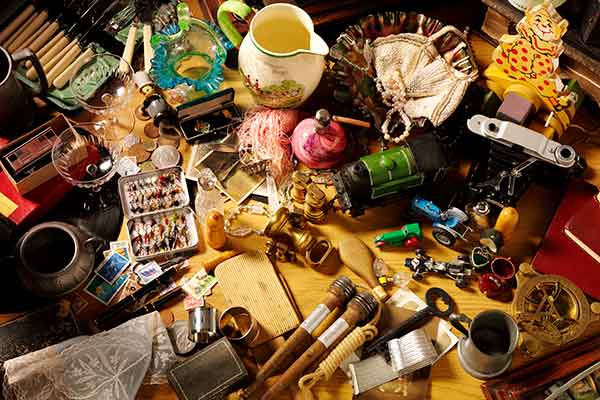We all know people whose homes are filled to the rafters with things. Difficult to navigate, people are unable to discard their belongings and are ashamed to let us see inside their house. They may be a family friend, relative, neighbor, or even yourself, and you are wondering how to help them or change the way you yourself live. Are they hoarders? Are you?
What is hoarding?
According to the American Psychiatric Association, “People with hoarding disorder excessively save items that others may view as worthless. They have persistent difficulty getting rid of or parting with possessions, leading to clutter that disrupts their ability to use their living or work spaces.”
There are several different types of items people hoard. Commonly hoarded items include:
- Paper (magazines, books, newspapers, cardboard, mail)
- Trash (empty cartons, scraps of food, broken items)
- Food (often expired and rotting)
- Animals (more animals than the person can truly care for, often resulting in urine and feces throughout the home)
- Bought items (items bought at stores but not used)
- Clothing (excess clothing beyond what a person can actually wear)
For all these types of items hoarded, or a combination thereof, the amount of material infringes on the daily life of the people who live in the home. Often cut off from their surrounding community due to shame, anger, or mental illness, many hoarders don’t get the help they need until legal action is taken.
What are the symptoms of hoarding?
Someone who hoards can be an issue by itself or be associated with another disorder such as obsessive-compulsive personality disorder, obsessive-compulsive disorder, unresolved trauma, and/or depression. Hoarding may also run in the family and those raised in a hoarded home are at greater risk of hoarding themselves. Other symptoms include:
- Inability to throw things away
- Unorganized clutter in the home
- Not knowing what to keep and where things belong
- Ashamed of the home’s condition
- Aversion to anyone else touching their belongings
- Irrational fears of needing an item or accidentally throwing something away
- Loss of living space in the home
- The smell or urine and feces in the home (due to pests, animals, or lack of plumbing)
- Financial difficulties
- Mental illness
- Social isolation
In addition to the collection of items, hoarding usually involves a deteriorating structure as well due to poor upkeep and the shame associated with letting anyone in the home to fix a problem.
Why does a hoarder need help?
In a hoarded home, there is a lack functional living space along with unhealthy and unsafe conditions. A person who hoards would rather find workarounds to issues such as broken plumbing and electricity than hire a professional to enter their home and fix the problem. Hoarding is also often the bone of contention between the hoarder and their family, friends, and neighboring community. Ashamed of the condition of their home, they rarely let people to see inside of it so the condition can be far worse than generally believed. For people who live with the hoarder, it can cause depression, anxiety, and anger towards the hoarder. In the case of children, living in a hoarder’s home can also cause developmental issues.
Due to the sheer amount of belongs, a hoarded home is a dangerous place to live for anyone – human and animal alike. Between the teetering piles of belongings ready to fall, the inability of first responders to get in and maneuver around the home, poor air quality, rotten food, present fire hazards, and urine and feces, a person or animal living in a hoarded home is in great danger of falling ill or dying due to the hoard.
Am I a hoarder or collector?
Hoarding and collecting are two very different things and can sometimes be confused. Collectors are selective about what they add along with how much money they spend and they regularly cull their collection. They are also proud of each item and enjoy showing their collection to others.
Hoarders are ashamed of the items they’ve collected and don’t like other people to see them. They neither cull their collection nor keep track of how much money has been spent on it. All the items collected are unorganized and get in the way of their living space. Even a group of items that start as a collection can devolve into later acquired items no longer resembling the original purpose.
For example, a person who hoards books bring into their home whatever books come their way and never culls their collection. Over time, the books start overflowing from the shelves and onto the steps of the stairs, on top of surfaces, filling rooms, and get in the way of normal functioning in the home. The person hoarding them may also start gathering magazines, catalogues, and newsletters. For a collector, though, a person will carefully select which books to add to their library, regularly pull out books they no longer want, and proudly display their collection to others.
If your collection is infringing on your daily life and your ability to live in your home, then you may need help for hoarding. Even people who don’t fall into the category of hoarders but whose homes are cluttered can still benefit greatly from hiring help to clean the items out and start life anew in a clean space.
Are you ready to change your life?
If you’re ready to clean out your home and change your life or help someone you know through this process, we at Bio SoCal are here to help you and tailor a solution to your needs. We handle both clutter cleanup and hoarding cleanup. Call us 24/7 and we’ll answer any questions you have along with providing a free estimate.

